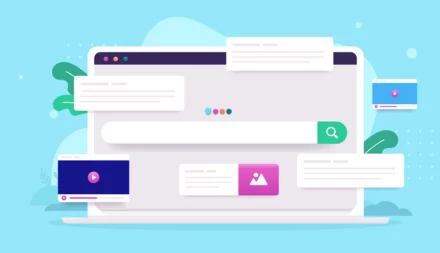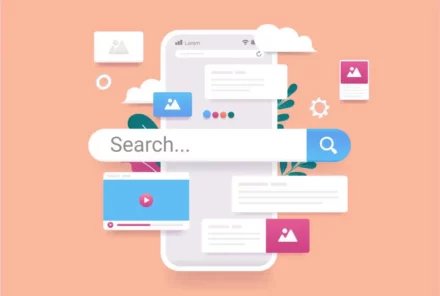The 6 Biggest SEO Challenges (And How to Solve Them)

The benefits of an effective SEO strategy as an integrated part of a wider marketing approach have long been recognised by marketers.
According to Google, 53% of consumers in the US report researching products on a search engine before making a purchase decision. And Search Engine Journal reported that 64.6% of SEO pros saw better results in 2021 from the channel than the previous year.
However, implementing an effective SEO strategy doesn’t come without its own challenges, including:
- Limited understanding of the power and role of SEO
- SEO is not seen as a real science – and it is a moving target
- Time to results is slower with SEO
- Problems around resourcing for SEO
- SEO can suffer as part of a siloed marketing approach
- A lack of partnership between In-House SEOs and external agencies
Free download: A Complete Guide to SEO Audits
6 challenges you might recognise in your SEO project
In this section, I’ll explore each challenge in turn as well as offering some help in terms of how to overcome them.
1. Limited understanding of the power and role of SEO
As an agency who provide SEO services as part of a broader portfolio, this is a challenge that we regularly come up against inside client companies.
Typically, what we find is that our direct SEO contacts have a strong handle on SEO and its potential. But the wider business is largely in the dark on this.
For your SEO initiative to be a success, you need to get the right level of buy-in on it at a range of levels inside your business; from management to the dev team that are responsible for prioritising changes to the website.
And in order to get that buy-in, people need to be clear on what they are buying into which can be a challenge in SEO terms.
Related: 5 Ways to Get Buy-In for SEO
How do you solve it?
The key to addressing this particular issue is to educate your internal target market on:
- What SEO is
- The role it has in company growth
- How they can play a part in its success by working together with you towards a common goal
This education process is about reaching out to people at all levels of the business via existing networking channels – through opportunities like lunch and learns, high levels of SEO visibility at company meetings and even dedicated training on SEO – to explain what the SEO team are up to and highlight recent success and case studies.
So, when other departments start knocking at your door with their own SEO projects – as opposed to the other way round – you will know you have turned a corner here!
2. SEO is not seen as a real science – and it is a moving target
As I shared during a recent webinar:
“The big challenge you have with SEO it is not an exact science. So, it is not as easy as ‘do X and get Y’.”
The challenge here is that there is often a greater degree of nuance to SEO compared to other channels like Paid Search, which have more discrete parameters to work within.
Take for example:
- Google Algorithm changes – the reality is that Google is constantly making changes to the way that search works. Iteratively releasing, testing and adjusting things on an ongoing basis – for example, in 2021 alone they ran over 700,000 experiments that resulted in over 4000 improvements to search. And that creates problems for marketers. In fact, research by HubSpot points to the fact that 50% of marketers see staying on top of the changes as their lead SEO challenge.
- Competitive changes – at the same time, the content that is being fed into the Algorithm is in a state of flux as new pages and content are published by your competition
How do you solve it?
The reality is that you don’t control either of the above factors. And the key to addressing their impact is to take a balanced approach to how you react to them.
On the algorithm front, it’ a balancing act between staying abreast of what Google is communicating publicly about changes (and also what the industry is saying too, we work in an industry that shares a LOT of information!) and being ready to react.
It’s also important to ensure you don’t react too quickly to every change. So you can give changes time to bed in to properly assess things from a data perspective once the dust settles.
While competitively, it is back to the familiar marketing challenge of making sure that you are simply better than the competition on all fronts. Outmuscling the competition on everything from titles, to meta-descriptions and blog content.
Related: Why You Need In-House and Agency Expertise to Drive SEO Success [webinar]
3. Time to results is slower with SEO
The upside on SEO can be really significant for brands that use a strategic approach to taking advantage of the opportunity.
But part of the challenge when it is compared to other ‘quick hit’ media options like PPC, for example, is the time it can take to bear real fruit by comparison. With PPC you commit spend, you turn the tap on and traffic – and hopefully revenue, depending on how effective your attribution is – piles in on the back of it. Well that’s the theory at least.
With SEO, it’s more of a marathon than a sprint and is a long-term strategy.
This can often mean that you encounter obstacles in everything from initial budget allocation to time pressure around results. The key to overcoming these particular challenges is a combination of good strategic planning and the effective use of data.
How do you solve it?
Be ready for the long-haul as you set out your plan.
Data can very often help you get the buy-in your need for your project but it is also key to keeping interest and support for it alive along the way.
So, make sure you set regular milestones for sharing success in the form of stats, mini case studies and performance highlights at regular intervals along the way.
And if you can tie these to wider business goals around growth and revenue, all the better.
4. Problems around resourcing for SEO
The reality is that your plans are only as good as what gets implemented on the ground.
And resourcing to meet the needs of plans can very often be the issue for SEOs. According to research by Search Engine journal 32.9% of SEOs cite lack or resources as the number one challenge they face.
How do you solve it?
Resourcing issues are going to surface in a range of different guises and prospective solutions are also going to differ depending on your circumstances.
For example, an in-house marketer who is stretched over many channels can combine the benefits of in-house and agency expertise to ensure that the SEO channel gets the focus it needs. By bringing in an SEO agency that provides quick access to expertise and “legs” to get SEO initiatives underway.
However, resourcing issues can show in other ways. Such as hitting roadblocks around getting website changes implemented with key SEO stakeholders such as web dev teams.
In these cases, we find the best approach is to be collaborative with these extended teams, bringing them into the planning process around SEO and also using data, wherever possible.
So you can make a strong case for prioritisation that ensure your changes leapfrog what is very often a lengthy backlog that far outstrips the resources in place to deliver it.
5. SEO can suffer as part of a siloed marketing approach
SEO can also suffer from a siloed mentality that can be prevalent by marketing teams that are structured rigidly around channel lines for everything from campaign planning and delivery to analytics.
One of the most basic examples of this that we come across is where Paid teams are placing adverts that are specifically designed to drive search behaviour with CTAs like “search (brand term here)” where the resulting search drives customers to pages that are at odds with the SEO strategy and potentially to content that doesn’t fit the planned customer journey.
How do you solve it?
The solution for SEO is to break out of the traditional model of just working with the Content and Web Dev teams and to start reaching across the aisle to marketers in other channels like Paid, Display and Digital PR. To ensure that there is alignment in the types of scenarios.
Related: Why You Need SEO and PPC to Work Together
6. A lack of partnership between In-House SEOs and external agencies
And this last challenge is one that is close to our hearts.
It was highlighted on our recent webinar where Joe Griffin, Senior SEO Manager at BT (and a QueryClick client) opened up to the fact that, prior to appointing QueryClick as an SEO partner agency, he had shied away from using agencies because of a combination of:
- aggressive tactics
- instances of the agencies laying claim to joint work
- a genuine fear that they would question his own expertise and judgement
How do you solve it?
To be successful in SEO you need a strong, collaborative relationship between in-house SEO teams and external agency teams.
The relationship needs to be built on the basis of full transparency, shared expertise and goals – and an unwavering commitment to celebrating joint successes as part of an extended team.
Related: 6 Tips to Choosing the Right SEO Agency
Need help solving your SEO challenges?
If any of that resonates with you, don’t hesitate to get in touch an initial, informal discussions around your own SEO challenges.
And in the meantime, download our Complete Guide to SEO Audits to help you get started with smashing your SEO goals.
Find out what makes QueryClick different
Get in touch to discuss your SEO challenges
Own your marketing data & simplify your tech stack.
Have you read?
I have worked in SEO for 12+ years and I’ve seen the landscape shift a dozen times over. But the rollout of generative search engines (GSEs) feels like the biggest...
As you will have likely seen, last week Google released the March 2024 Core Algorithm Update. With it, comes a host of changes aiming to improve the quality of ranking...
After a year of seemingly constant Google core updates and the increasingly widespread usage of AI, the SEO landscape is changing more quickly than ever. With this rapid pace of...




